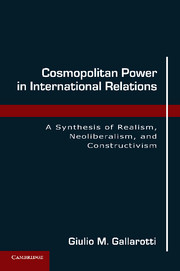 Cosmopolitan Power in International Relations
Cosmopolitan Power in International Relations Book contents
- Frontmatter
- Contents
- Preface
- Introduction
- 1 The Theory of Cosmopolitan Power
- 2 Crucial-Case Textual Analysis of the Founding Fathers of Realism
- 3 Crucial-Case Textual Analysis of the Founding Fathers of Realism
- 4 Case Studies of Soft Empowerment
- 5 Case Study of Hard Disempowerment
- 6 Case Study of Soft Empowerment
- 7 Conclusions
- Appendix Formal Model of Cosmopolitan Power
- References
- Index
4 - Case Studies of Soft Empowerment
Free Trade, the Classical Gold Standard, and Dollarization
Published online by Cambridge University Press: 05 June 2012
- Frontmatter
- Contents
- Preface
- Introduction
- 1 The Theory of Cosmopolitan Power
- 2 Crucial-Case Textual Analysis of the Founding Fathers of Realism
- 3 Crucial-Case Textual Analysis of the Founding Fathers of Realism
- 4 Case Studies of Soft Empowerment
- 5 Case Study of Hard Disempowerment
- 6 Case Study of Soft Empowerment
- 7 Conclusions
- Appendix Formal Model of Cosmopolitan Power
- References
- Index
Summary
The next three chapters present case studies for the purpose of illuminating and partially testing the theory of Cosmopolitan power. By carefully tracing the benefits generated by soft power (soft empowerment) and the weakening effects of strategies excessively oriented around hard power (hard disempowerment), these chapters render a testament to the desirability of a diversified foreign policy that embraces some Cosmopolitan balance among the two sources of power. As with most case studies, there is a natural “boundedness” in the inferential power of the results because of limited observations. In this respect, they fall short of being “strong” tests of the theory. However, there are several qualities of these case studies, enumerated in the Introduction, that render the findings somewhat more inferentially compelling, thus raising their value as tests.
The three cases of soft empowerment considered in this chapter illuminate a process in which soft power enhanced the economic influence of actors that had already attained economic primacy (i.e., largely through hard power) in their respective spheres. All three cases show endowments of hard power being supplemented by soft power in the augmentation of economic and political influence. In these cases, the principal source of soft empowerment was the endearing qualities of the economic policies of the United States and Great Britain. These endearing qualities, which resulted from the admiration and respect generated by the economic primacy achieved by these nations in specific issue areas, caused other nations to emulate the policies of these role-model nations. Emulation created a greater political-economic milieu that was favorable to the interests and goals of the role-model nations. In each case, already powerful economic actors found their economic and political influence augmented by economic and political opportunities provided by the cultivation of soft power. This enhanced influence, in turn, generated even greater hard power for the respective nations (i.e., greater economic primacy and political advantages). Hence, the cases reveal a Cosmopolitan interaction process between hard and soft power resources.
- Type
- Chapter
- Information
- Cosmopolitan Power in International RelationsA Synthesis of Realism, Neoliberalism, and Constructivism, pp. 156 - 179Publisher: Cambridge University PressPrint publication year: 2010


